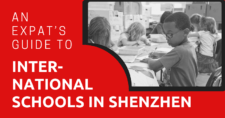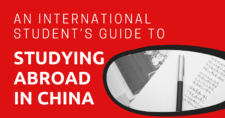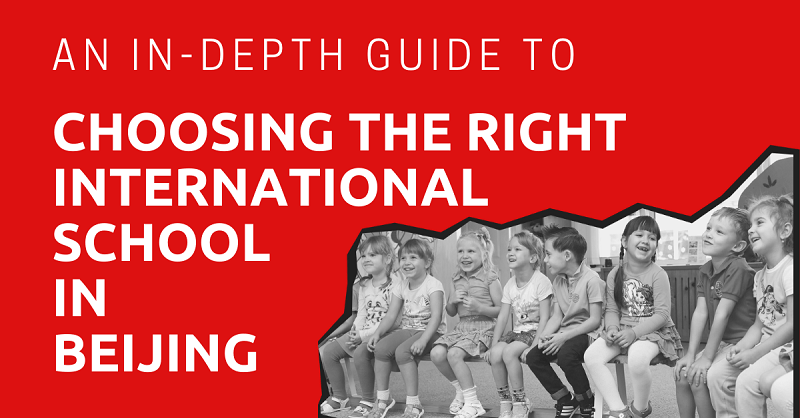
If you’re moving to Beijing and you have children, then the choice of the school they will attend is one of the most important you will make. It will impact not only their education, but how well they settle in their new home.
Unless you or your partner are Chinese nationals, then that’s going to mean finding an international school. Chinese state schools are only open to those with the right hukou—the registration certificate crucial to accessing public services in China.
The good news is that Beijing has many excellent international schools. The bad news is that you may need a stiff drink when you see the fees! In this article we’ll guide you through the process of finding the right school for your child(ren), setting out some of the factors you will have to consider and offering advice on what to look out for.
This article will take approximately 27 minutes to read. Don't have the time right now? No worries. You can email the ad-free version of the article to yourself and read it later!
Disclaimer: This article may include links to products or services offered by ExpatDen’s partners, which give us commissions when you click on them. Although this may influence how they appear in the text, we only recommend solutions that we would use in your situation. Read more in our Advertising Disclosure.
Contents
Background
Education is big business in China. Academic achievement is prized above almost everything else, and parents are willing to invest heavily to get their children into the best universities.
Prior to China’s opening up, international schools were mainly for the children of diplomatic staff and the few foreign business owners in China. However the past three decades have seen an explosion in new school openings. In just 10 years, from 2010-2020, the number of international schools more than doubled, from 351 to 821.
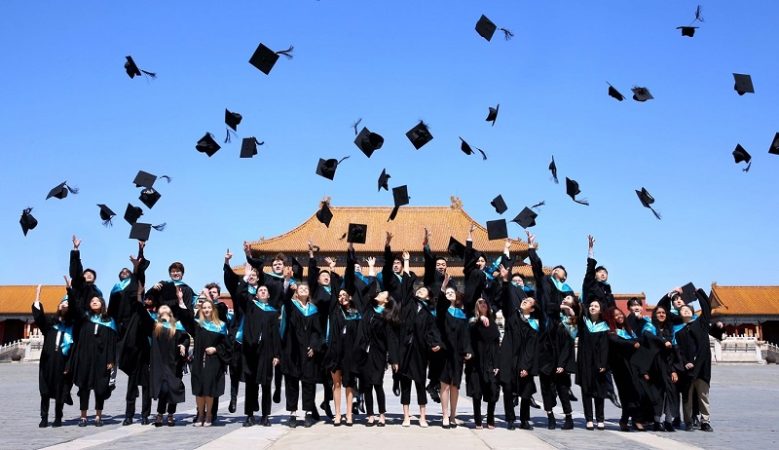
Meanwhile the number of expats in China is falling. Over the same period, the number of foreigners in Beijing nearly halved, from 107,445 to 62,812. The growth has been fuelled by local parents choosing an “international” experience for their children.
True international schools can only accept children with foreign passports. The majority of schools presenting as international are actually Chinese-owned schools which deliver some or all of their teaching in English. These are sometimes referred to as “bilingual” rather than “international” schools, but the distinction isn’t universally observed. Some of these schools have a diverse student body, others are overwhelmingly local. Sometimes the children of western teachers are the only non-Chinese students.
July 2021 China Education Reforms Update
In recent years the government has clamped down on private schools, concerned that their students were not receiving the correct political education. In July 2021, new regulations were announced which required them to teach the Chinese curriculum in full. This includes British-branded schools such as Harrow, though it should not affect schools which accept only students with foreign passports.
Political education is a compulsory subject throughout the Chinese curriculum. At elementary level, the emphasis is on morality: being a good student and a good citizen. At higher grades, ideology is taught specifically. “Xi Jinping thought” has recently been incorporated into the curriculum, which suggests that there is still a focus on this issue at the highest level.
What exactly this will mean for bilingual schools with an international slant is not, at the time of writing, entirely clear. Past experience suggests some sort of compromise will emerge. However, when choosing a school, you should be aware that your child may have to take political classes with content prescribed by the Chinese government. If this concerns you it is worth discussing the issue with prospective schools.
According to the regulations, this will also affect after-school tutoring companies, online education, and other for-profit education providers in ways that we cannot yet predict.
Curriculum
Related to the question of language is that of curriculum. Apart from those with a specific national connection like LFIP, international schools deliver an education based on either the US, the English system, or the International Baccalaureate.
While debate rages in the education world about which curriculum is “best”, for individual students it is more a question of which one suits you personally. If you are from the US and planning to return within a couple of years, then an American program will make for easy transitions. IB arguably works better for high-achieving children, who can meet its demands and thrive on its challenges. Other students may do better in the rigid structure of the Cambridge program.
Common Core
The USA does not have a “national curriculum” like England’s, so American-based curricula are built around the Common Core. This sets out what children are expected to achieve in English, math and humanities, but still leaves considerable flexibility for tailored approaches, so be sure to ask for further details when considering a school.
English National Curriculum
Curricula based on the English National Curriculum generally follow the Cambridge programme. Cambridge Assessment International offers qualifications equivalent to the English General Certificate of Secondary Education (GCSE) and Advanced Level (A-level), but tailored for the international market. The iGCSE exam is taken in Grade 10 and A-levels at Grade 12. A-levels are accepted for university entrance almost everywhere in the world.
The International Baccalaureate
The IB is a relative newcomer to the scene, having been around since 1968. While it covers the same subjects as the more traditional Cambridge programme, it takes a very different approach. IB places more emphasis on the process of learning than the acquisition of knowledge. It requires students to manage their own projects, to reflect on their experiences and develop critical thinking skills.
The IB “Continuum” consists of three programs: Primary Years (PYP, Kindergarten to Grade 5), Middle Years (MYP, Grade 6 to 10) and the Diploma Programme (DP, Grades 11 and 12). Alongside the usual subjects MYP students study Theory Of Knowledge, and there is a mandatory Creativity, Activity, Service component in the Diploma Programme, which usually involves some sort of community service.
Early Years Schools
Kindergartens often use child-centered, enquiry-led approaches such as Reggio Emilia or Montessori. Be aware, however, that there is no accreditation process or protection of the Montessori brand, so any organization can use the word “Montessori” without having to meet specific standards. The International Montessori School of Beijing (MSB), however, is a respected and well-established institution offering education up to Grade 8.
Years or Grades?
One area which may cause confusion is that some schools use US Grades while others use Years like British schools. The simple way to convert between systems is to add one to the Grade for the Year: so, for example, Grade 5 is Year 6. A common piece of jargon you will see is “K-12”, referring to a school which accepts students from Kindergarten through to Grade 12.
Language
One fundamental issue you will need to consider is the language(s) in which your child will be taught. Mostly this means the balance between English and Chinese, but there are a few schools which teach in other languages. The Lycée Français International Charles de Gaulle de Pékin (LFIP) is a long-established school delivering the French curriculum mainly in French, although it also caters for speakers of English and Chinese.
The Swiss School teaches in German, as does the German Embassy School. House of Knowledge International Kindergarten offers a Reggio Emilia approach in German, as well as English and Chinese.
For most parents, the crucial question is how far you want to immerse your children in local language and culture. On the one hand, being surrounded by a language all day is a great way to learn it; on the other, if your children do not have a good grasp of Chinese already, they may struggle educationally and socially. Yew Chung International School of Beijing (YCIS Beijing) offers a “best of both worlds” here in Kindergarten and Primary (up to Grade 5), with teaching being delivered in both English and Chinese in the same classes.
Your preference may be guided by how long you plan to live in Beijing. If you are only staying a couple of years, you may be looking for the least disruption to your child’s education. If however you are planning for the long term, then an “in at the deep end” approach might be the quickest way for your child to adjust.
Locations
Beijing is big, and getting around can be a nightmare. Despite an extensive and ever-growing subway system and Didi (China’s Uber) drivers on every corner, traffic congestion is a fact of life. And while the subway is modern and efficient, at peak hours it can be an uncomfortable crush.
Location is therefore going to be a key consideration when choosing a school. Even if you are in a position to employ a driver, an hour or two a day spent sitting in traffic extends what is already a long day for children. Especially for younger kids, you are likely to be looking for a school close to your home—or for a home close to the school of your choice.
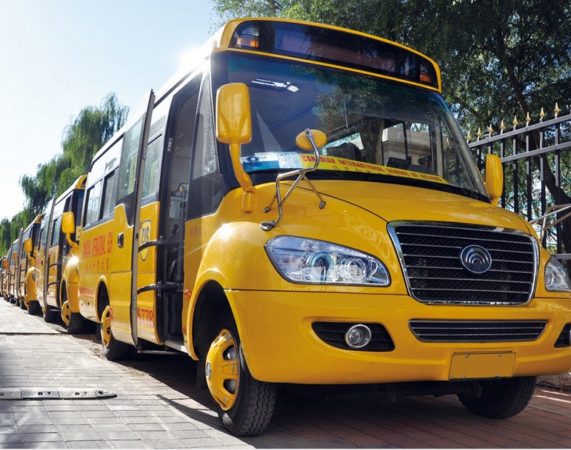
The majority of the big international schools are clustered together in Shunyi. This is the area surrounding Beijing Capital Airport, to the north-east of the city, and historically popular with expats. It’s a new district well supplied with malls and restaurants, but it lacks the cultural attractions and bustling street life of downtown Beijing. You may find it a long haul to the city center, if that’s where your job or social life are rooted.
Another cluster of international schools can be found in Chaoyang, the east-central district of Beijing. Chaoyang itself is bigger than many cities, so traveling from one side to the other can be quite a trek. However it’s a lively place, including both the Central Business District and the nightlife hub of Sanlitun. Downtown schools often have smaller sites than the sprawling campuses of Shunyi.
A third “educational zone” centers on Beijing’s prestigious Tsinghua University, in the Haidian district. Haidian has all the facilities you would expect in an area with so many students, although the schools tend to be more Chinese than truly international.
Fees
While we all want the best for our children, cost is inevitably going to be a factor for most of us. School fees in Beijing are staggeringly high, globally second only to New York City. This is in part a legacy of tradition: expats were generally sent to Beijing as an assignment for a few years, either by their employer or their government, and offered a generous package as a sweetener. School fees and medical insurance were usually included.
This sort of package is now limited mostly to diplomatic staff. Contemporary expats are more likely to be entrepreneurs, or younger people seeking adventure. Paying fees which range from $30,000 upwards, for each child every year, can be challenging, to say the least.
Read more about China’s cost of living here.
However the changing profile of expats has done nothing to reduce prices. China’s economic miracle resulted in a generation of well-off parents determined to get their children into top universities. The one-child policy, and the cultural expectation that your offspring will look after you in your old age, further drove the boom in expensive private schooling.
Whether the government’s crackdown on the education sector, and its determination to remove the profit motive from school provision, will reduce those pressures and lead to a lowering of fees, remains to be seen. Previous initiatives to reduce homework and shorten study hours had little impact. Even the Chinese Communist Party can’t “push the river uphill” when it comes to changing educational culture.
Additional School Costs
Unfortunately, these fees are only the beginning of the costs involved. Expect to pay for meals, uniforms, transport, extra-curricular activities, and sports equipment. Many schools charge a substantial fee ($300-500) simply for applying to them. The fee is not returned if they don’t accept your child.
If you’re not lucky enough to have these costs met by your employer, there are few options. Some schools offer scholarships, but these are usually only for existing students. If the right school for you is out of your price range, it’s always worth talking to them privately to see what can be arranged. Ultimately however, these are businesses in a sellers’ market, so don’t be surprised if you meet with polite rejection.
Cheaper Options
Although we said earlier that state schools are only for holders of Beijing hukou, some of the more prestigious schools have international sections. This includes the schools attached to Tsinghua and Beijing Normal University (a “Normal” university was originally founded for teacher training), and Chaoyang’s highly-regarded Fangcaodi School.
These are private programs, but the fees are significantly lower than the foreign-owned schools. However, places are very limited, and hard to get. If you want your child to attend one of these schools, you will need to learn what guanxi means, and start accumulating it fast!
Mismanagement of Schools
When it comes to money, one further aspect that is important to consider is the school’s financial stability. Despite the enormous fees charged, the highly competitive nature of the market means that some schools are quietly struggling. These are usually the smaller, newer schools, but this is not always the case.
In 2018 Beijing BISS International School (BISS), a small but long-established and well-regarded institution, ran into financial difficulties. Stories emerged of teachers left unpaid, of no soap or toilet roll in the restrooms, of charity money going missing. The difficulties appear at least in part to have been caused by an ambitious project to build a new sports dome.
The crisis elicited considerable goodwill and loyalty from BISS staff and parents, and the city authorities stepped in to turn the school round. In fact, BISS is now perhaps the least likely school to experience financial problems. However it stands as a warning to how quickly things can go wrong even at good schools.
Checking a school’s finances is not easy. You can’t ask to examine their accounts, and the business aspects might be run by entirely different people to the educational provision. However it’s worth keeping an eye out for the warning signs: sudden changes in contractors, unexplained shortages, discontented staff or unfinished works.
Wellbeing
Moving across the world and being plunged into a new culture can be challenging and stressful for children, although it also offers amazing opportunities. You will need to consider what schools do to help when children are struggling emotionally. Be aware that the role of “counselor” in many schools means someone who advises on college applications, not someone qualified to offer emotional support.
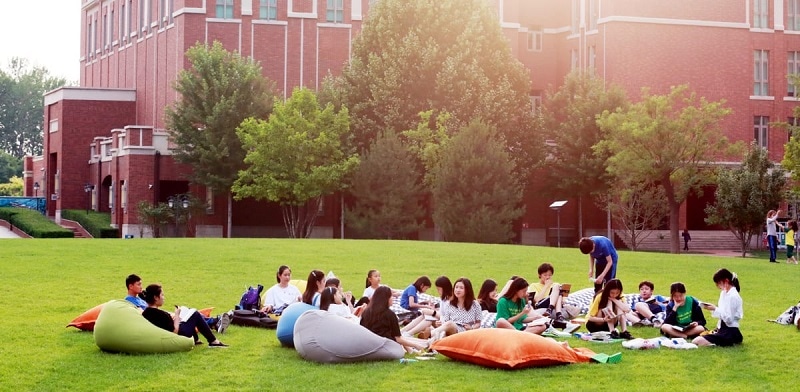
Bullying in prestige schools can be swept under the carpet, rather than having to admit to problems. Ask about the school’s anti-bullying policy, and find out whether students are aware of it; this will indicate whether it’s put into practice or just a document. Ask about homework policies too. Chinese educational culture favors lengthy, time-consuming homework from a young age, which can be ineffective or even harmful for children.
Special Needs
While Chinese schools have an admirable record when it comes to passing exams, provision for those who need extra support lags behind the rest of the world. Disability is often seen as something shameful, to be hidden away, and a child’s academic record has considerable impact on the parent’s social standing.
Most of the bigger international schools have some form of learning support, but these will tend to focus on the students lagging a little behind, rather than on children with significant learning difficulties. In particular, services for children on the autistic spectrum are woefully lacking.
If your child has specific needs, then it’s crucial to be upfront with the school and talk about it. A small school where they will get more individual attention may be a better choice than a big institution with impressive facilities. However, don’t imagine you can just turn up in Beijing and get the same support for your child that you might expect in the west. You will need to start planning before you even leave home.
Air Pollution
Many of the sports facilities include a dome or other covered field, and this indicates another factor you will have to consider. Beijing’s air pollution is, thankfully, not as bad as at its peak in 2013. However dangerous particles still exceed the levels considered safe, and young lungs are particularly vulnerable.
Living in Beijing, you will soon become familiar with the Air Quality Index (AQI). Ask schools what their policies are for “high AQI days”—are students simply kept inside? Most schools will have an air filtration system of some kind. It’s worth checking how old the system is and how it is maintained.
Religion
Religion in schooling is a sensitive issue in China. While freedom of religion is guaranteed by the Constitution, the state is firmly atheist and views religious activity with suspicion. Foreigners are generally left to their own ways, so you needn’t fear practicing your faith, but locals are only permitted to worship in state-approved churches.
Schools with an avowedly Christian ethos, such as YCIS Beijing and Daystar, tread lightly and carefully in this area. There is a Jewish school: Ganeinu International School accepts foreign pupils only and teaches a combined US-Israeli curriculum. No other religions have a school dedicated to them. However, you will find most international schools to be inclusive, and supportive of all beliefs and faiths.
Extracurricular Activities
Where Beijing’s international schools really shine, and begin to justify the extravagant fees, is in the extracurricular opportunities available to students. Some of the big Shunyi campuses have arts and sporting facilities which would put many towns to shame. Almost any activity you might want your child to participate in can be found at one or other of the schools.
Establishments with a British background obviously lean towards British sports: Dulwich College Beijing (DCB) has the city’s only cricket pitch. American football and baseball are not much represented though: basketball, volleyball and soccer are the most popular team sports.
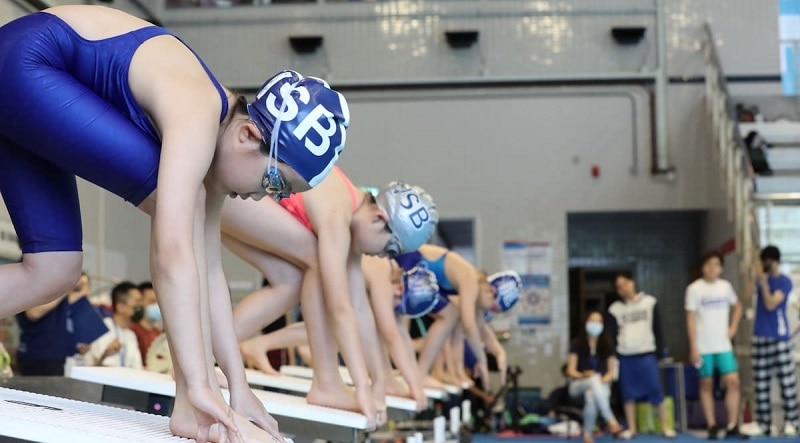
Many international schools are affiliated to the Association of China and Mongolia International Schools (ACAMIS), or to other similar organizations promoting inter-school sporting competitions. Almost every school, however small, has a swimming pool.
Extracurricular activities are unlikely to be a prime consideration in your choice, but the availability of a specific opportunity might just be the deciding factor if the decision is a close one.
Homeschooling
Homeschooling is an increasingly popular choice in the west, and if you can afford for one parent to stay home, may offer a solution to the problem of high fees. Homeschooling is technically illegal in China, but the good news is that law does not apply to children with foreign passports.
If you choose to homeschool, you will need to give thought to your child’s socializing and friendship needs. Children playing outdoors are not encouraged in Beijing, and it’s easy to become isolated indoors, hunched over a screen. Also consider the amount of contact your child has with local culture. Even in the best international schools, it’s possible to get trapped in the “expat bubble” and not make the most of the adventures and discoveries to be found in Beijing.
Guide to Selected Schools
Do you know your BCIS from your CISB? The list of international schools in Beijing can seem like an alphabet soup of acronyms, many of them confusingly similar. To help you find your way around, here’s a quick guide to some of the better-known schools.
Beijing’s oldest international school, and one of the biggest, is the International School of Beijing (ISB). Based on a vast campus in Shunyi, ISB teaches the IB program, and has impressive facilities.
Snapping at its heels in terms of size, reputation and amenities is the Western Academy of Beijing (WAB). WAB is technically in Chaoyang, but as it’s in the far north-west by the Airport Expressway it’s generally regarded as a Shunyi school.
Almost next door to ISB is Beijing New Talent Academy (BNTA), a rapidly expanding school with predominantly Chinese students.
Another fast-growing newcomer is Keystone Academy. Like BNTA, Keystone is a boarding school, geared to preparing students for university life in North America or Europe. It’s in huge demand with Chinese parents and has a rigorous selection policy, but has few international students.
Not far from Keystone is Beijing International Bilingual Academy (BIBA), an increasingly popular choice for local and expat parents alike.
Beanstalk International Bilingual School (BIBS) has expanded from a kindergarten to a K-12 school with over 3,000 students and campuses across the city, which suggests it’s doing something right too.
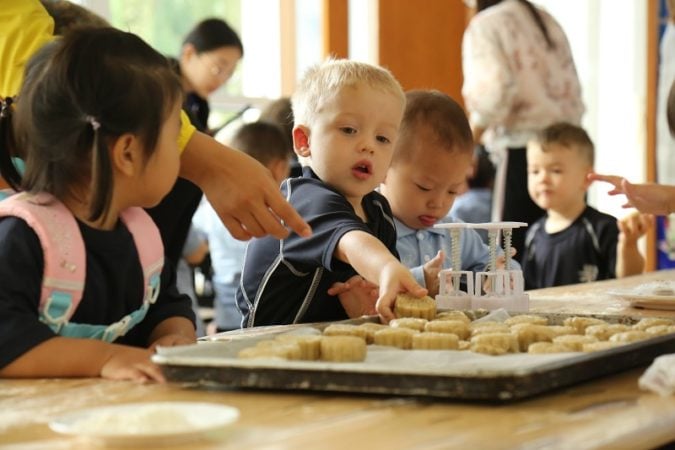
Parents also love Daystar Academy, a small, friendly school halfway between Shunyi and downtown.
Of the schools linked to British institutions, Dulwich College Beijing (DCB) is a true international school with excellent academic records.
Harrow Beijing also has a solid reputation but accepts local students alongside foreign passport holders.
The British School of Beijing (BSB) is a brand owned by global education giant Nord Anglia. They have a well-regarded K-12 school in Shunyi, on the same road as ISB and BNTA, and an elementary school in downtown Sanlitun (note that these are separate schools, not two campuses of the same school.)
Heading downtown, 3e International School is handily placed in the expat-friendly Lido district.
The Canadian International School of Beijing (CISB) can be found in Liangmaqiao, near many embassies, and has a diverse student body.
Beijing City International School (BCIS), one of the biggest of the downtown schools in the center of Chaoyang along with previously mentioned BISS and YCIS.
Note: These are some of the biggest and best known schools, which are likely to appear on your longlist. Their inclusion here does not constitute an endorsement, and no criticism is implied of those schools not mentioned.
Top Tips for Choosing a School
The process of choosing a school can be intimidating. There is an abundance of choice, and international schools tend to use the same language in their marketing: they are all (or claim to be) “globally minded” and “academically outstanding”, producing “future leaders” and “intercultural ambassadors.”
Jingkids International (formerly beijingkids) produces an annual School Choice Guide, which is a good place to start. They also host an International School Expo every spring, which gives you the opportunity to talk to staff from schools all across the city.
Once you have a shortlist, a visit to prospective schools is essential if at all possible. Try not to be overwhelmed by the tour of the fabulous facilities and the slick marketing presentation; prepare a list of the questions you want to ask, and be alert for red flags, such as evasive answers, unhappy children, poor maintenance or extravagant promises.
Other parents are a valuable source of information. As so often in China, WeChat is the place to go. There are numerous English-language parenting groups and education discussions, which are usually welcoming to new members with genuine questions. You will find that parents can be realistic about the challenges and costs of education while also able to identify the positives of their children’s schools.
We have looked at many factors which might influence your choice, but perhaps the most important is something only you can gauge: the school’s ethos. More than curriculum or facilities, the best predictor of whether your child will flourish is whether the school aligns with your and your family’s values.
Now, on to You
If all this seems intimidating, remember that Beijing has many excellent international schools, and whichever you choose your child is likely to receive a world-class education. Schools like to compete with each other, but from a parent’s point of view there is no “best” school: just the best fit for you and your child’s needs. Good luck!


